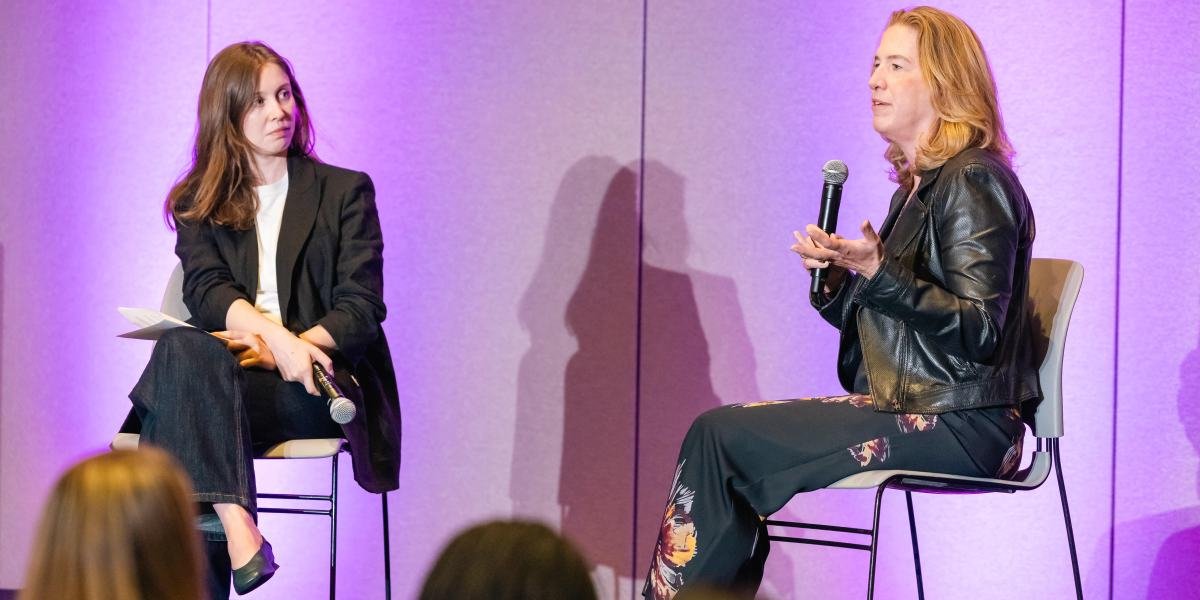In today’s edition: the future of food, the power of women’s soccer sponsorships, and the future of AI talent.
– All about AI. Last week, I spent two days in Las Vegas at the biggest AI conference in North America. Ai4 was a classic, massive Vegas event with crowds of people everywhere eager to build careers in today’s hottest technology.
I was there to interview Margo Georgiadis, the former Google exec and CEO of Ancestry who now runs the biotech company Montai Therapeutics, using AI to combat chronic diseases. Our talk was titled as a fireside chat about women in AI leadership—and a few minutes before it was scheduled to begin, something remarkable happened. It seemed as if every woman at this male-dominated conference one-by-one walked into the room.
To me, the interest in hearing from Georgiadis about this topic revealed a few things. Women are eager to be part of the future of AI. Even if we’re outnumbered, we’re here. And women are hungry to meet and learn from other women in what can be a difficult field.
Georgiadis has been on all sides of AI—working with both AI-native startups building from scratch and legacy businesses figuring out how to integrate AI successfully. (She sits on the board of McDonald’s.)
She tells these businesses that figuring out how to better attract female talent could solve some of their problems. Instead of offering pay packages in the hundreds of millions for AI talent, how about making their companies work for women? “Women disproportionately care about impact and working somewhere where they feel like they belong, more than just getting a big pay package,” she told this crowd. “If we’re going to bring more women talent into those core AI companies, we have to think differently about how we recruit, attract, and promote talent.”
For some AI-native companies, that’s a tough shift to make. Some founders believe that we’re in a “war” for who’s going to win AI and “we just have to do whatever we can to stay ahead in these industries,” she said, whether that’s requiring employees to work 80-hour weeks or be on call at all times. Women are eager to work hard—but those structures often don’t work for those with caregiving responsibilities.
The “war” approach might gain an advantage in the short term, but in the long term, those strategies won’t win, she argues. Truly generational companies require all kinds of talent—women included.
Emma Hinchliffe
emma.hinchliffe@fortune.com
The Most Powerful Women Daily newsletter is Fortune’s daily briefing for and about the women leading the business world. Subscribe here.
ALSO IN THE HEADLINES
Future of food. Land O’Lakes CEO Beth Ford writes a new op-ed about the future of American agriculture. A “storm is gathering” for the American food system that people don’t fully understand, she writes in Time.
Buying power. Women’s soccer fans are among the most likely to purchase based on a brand’s sponsorship of a team or league. Compared to other women’s sports, soccer fans are 58% more likely to buy from a sponsor.
State of stats. In this piece about the future of the Bureau of Labor Statistics, former Fortune journalist Beth Kowitt unearths a trend: measurement of statistic related to women and work is going away. The share of S&P 500 companies disclosing data on women in management dropped by 16% compared to last year.
ON MY RADAR
The marketer’s guide to Taylor Swift’s Life of a Showgirl era Adweek
Opendoor CEO’s resignation underscores the power of visibility Inman
Why Kirsten Dunst is our cool girl colossus Town & Country
PARTING WORDS
“There are young girls who want to get into tech or business and haven’t seen that reflected in the people they see working. If this film can change that, then that to me would be such a huge achievement.”
— Lily James on her new movie Swiped about the rise of Bumble









